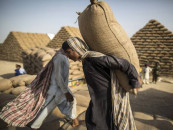Economy under severe stress due to war on terror: auditor general’s report
Says loss-making state-owned firms also threaten growth, stability.

The energy shortage and security issues restricted economic growth from 2008 to 2012 to an average of a meagre 3%. PHOTO: FILE
“The deteriorating security situation is a major risk to growth and stabilisation prospects,” the report said, adding that the energy shortage and security issues restricted economic growth from 2008 to 2012 to an average of a meagre 3%, well below the 8% needed to create enough jobs to absorb the population entering the workforce each year.
The audit, while examining the performance of the Ministry of Finance, said that delay in reforming the public sector enterprises posed a risk to growth and stability.
The report also said that large loss-making state-owned firms sap precious and finite fiscal resources. A number of public sector enterprises, especially in the power sector, transportation and agriculture sectors operate without hard budget constraints and incur heavy losses. Subsidies are then released to cover these losses, amounting to nearly 2% of the gross domestic product in 2010-11, divert resources away from more productive spending.

Government’s resources had been drained considerably due an increasing burden of contingent liabilities in order to cover the losses incurred by state-owned firms. Accordingly, the contingent responsibility of the government had been stretched to the limit as these companies lacked the capacity to service their obligations.
Efficient fiscal adjustment will be needed on government’s part to tackle the root causes of the losses by comprehensive restructuring and introduction of a corporate management/responsibility structure, rather than absorbing their liabilities. High inflation and continued heavy fiscal support to them was adding pressure on the fiscal deficit – government’s revenue minus expenditures, the report also said.
A Cabinet committee on restructuring was constituted to restructure key public sector enterprises such as Pakistan International Airlines, Pakistan Electric Power Company, Pakistan Railways, Trading Corporation of Pakistan, Utility Stores Corporation, Pakistan Steel Mills and the National Highway Authority with a view to stop leakages caused by the annual losses amounting to approximately 1.5% of the GDP. The objective of the committee was to turnaround these state-owned firms into profitable, self-sustaining ventures under a public-private partnership.
Failure to steer them into profitability, coupled with the energy crisis and the circular debt is a major threat to growth and stabilisation prospects.
Development spending for the financial year 2005-06 stood at 4.8% of the GDP, and while that figure had narrowed down to 3.1% during fiscal 2011, Pakistan’s economic performance in 2011 reflected largely the same structural weaknesses that contributed to the macroeconomic crisis suffered by the country in 2008. Meanwhile, the devastating floods had also constrained the growth of the economy.
Moreover, the continuous overhanging commodity finance debt stock, if stayed unchecked, threatens to constrict access of the private sector to bank credit, while simultaneously increasing the interest rates.
The audit recommended that the government should focus on public sector enterprises to improve overall corporate governance and plug leakages, eventually resulting in reducing fiscal burden and increased public sector savings.
The spokesperson of the Ministry of Finance refused to offer any comments despite repeated attempts by The Express Tribune.
Published in The Express Tribune, January 19th, 2013.
Like Business on Facebook to stay informed and join in the conversation.



















COMMENTS
Comments are moderated and generally will be posted if they are on-topic and not abusive.
For more information, please see our Comments FAQ